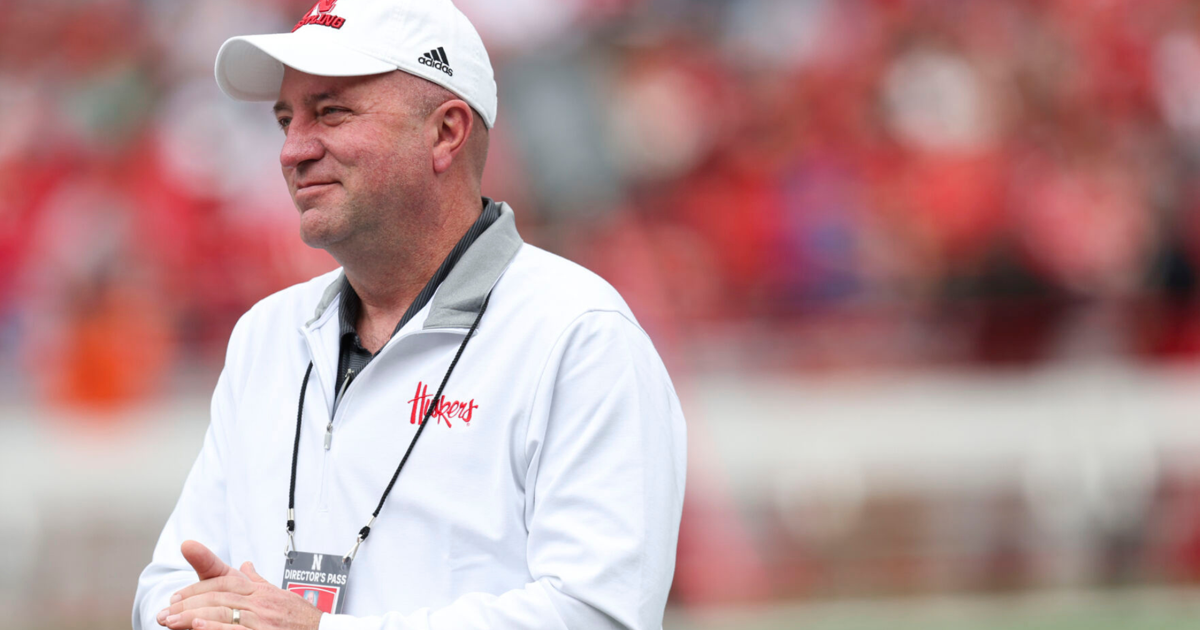
Troy Dannen applied the hairspray and walked onto the bright hardwood floor. Showtime.
It was Feb. 16, 1987, and this was no ordinary game. Dannen — a 20-year-old college student — knew the history at stake. So did a crowd of 4,000 people that packed the Mason City High School gym. A throng of media also made the trip to north-central Iowa, including ESPN, which parked a satellite truck just outside.
The star of the night was Lynne Lorenzen, a 6-foot-2 dynamo from nearby Ventura who arrived 39 points shy of the national career scoring record by a high school basketball player. Dannen — like he would be at many area football and basketball games — was a referee for the girls six-on-six contest.
A few minutes after tipoff, Lorenzen had two fouls and no points.
“If she fouls out and doesn’t break the record,” Dannen told his partner at halftime, “they’re not going to invite either one of us back.”
People are also reading…
Lorenzen eventually hit the all-time mark in the third quarter on her way to a 54-point night. Action stopped briefly as she received flowers and the game ball.
What stood out to Dannen was the man doing the presenting. E. Wayne Cooley, executive secretary of the Iowa Girls High School Athletic Union, was a legendary local figure for growing and championing girls high school sports. Dannen made a point of introducing himself afterward and boldly asked about an internship.
A generation later, Dannen is in his first days as Nebraska’s $1.6 million-per-year athletic director. If his career took off as AD at Tulane (2015-2023) and for a few months at Washington after that, the formative runway was 49 years in Iowa. Half of his working life happened in the state where he made more out of less, first expanding high school girls sports and later Northern Iowa athletics from the shadows of bigger brands and budgets.
Ambition fueled him. Giants mentored him. Dannen traces most of it back to that cold winter night when Cooley said yes to an enthusiastic Northern Iowa undergrad in zebra stripes he had just met. For the next two decades, the former farm boy and future Power Five influencer poured himself into the details and direction of the only high school governing body in the country dedicated solely to girls athletics.
“It wasn’t the path I was expecting,” Dannen said. “But it was a path.”
Nebraska head coach Fred Hoiberg (left) and assistant coach Nate Loenser (right) speak with newly appointed Nebraska athletic director Troy Dannen during an open practice on March 21 at FedEx Forum in Memphis, Tenn.
KENNETH FERRIERA, Journal Star
In an historically uncertain era of major college sports, the skills Dannen learned during his unorthodox rise will come in handy at Nebraska. What gets his heart bouncing like a basketball on sectional night has never been the status quo.
‘Anything you can do to be around sports’
Bob Bowlsby chuckles. The 72-year-old has met scores of athletic administrators, and none are quite like Troy Dannen.
Bowlsby — most known for his time as athletic director at Iowa and Stanford and later as Big 12 commissioner — was AD at Northern Iowa when he first met the student assistant in media relations. They’ve stayed in touch ever since, talking at least once a month for 30 years.
Dannen calls Bowlsby a mentor. Bowlsby considers himself an old friend. Even when their careers weren’t intersecting for much of the 1990s and 2000s, the veteran AD saw Dannen had that “it” factor. He just didn’t know if it would ever shine on a national stage.
“He’s a very persuasive guy and he’s very likable,” said Bowlsby, serving this spring as UNI’s interim athletic director. “He builds strong relationships and he will at Nebraska too. It won’t be very long before he’ll know everybody’s children’s names and what the spouses do and who’s related to who. He’s a very, very good relationship builder.”
Dannen’s background is unlike any permanent AD in modern Nebraska history. Bob Devaney and Tom Osborne were championship football coaches. Bill Byrne and Bill Moos were career college admins. Steve Pederson got his start as a recruiting coordinator for major football programs. Shawn Eichorst’s stock took off quickly as AD at Wisconsin-Whitewater, where he was once a football team captain. Trev Alberts played in the NFL and served as an ESPN analyst before pivoting to college athletics.
Dannen never coached. His first college job after college came at age 41 when he went from underdog candidate to Northern Iowa athletic director. The native of Le Grand, Iowa, participated in sports year-round at his small rural high school — his senior class was 38 people in 1984 — but wasn’t great at any of them. He played on a winless basketball team. His baseball squad took off when he transitioned from starter to student assistant.
“I was not a standout,” Dannen said. “I occupied a spot.”
He just knew he loved being around sports. He tried athletic training at Iowa State for a semester. Not for him. He transferred to Northern Iowa and applied on a whim for an opening in the athletic department in media relations. He stayed for four and a half years, serving as the primary contact and record keeper for the women’s basketball team. Dannen did public-address work at track meets and logged statistics for football and men’s hoops home games.
Longtime UNI sports information director Nancy Justis, who retired in 2006, cycled through countless student helpers during 30 years in the department. Perhaps none had the passion and ability of Dannen, whom she even trusted to travel with the women’s team and represent the Panthers.
“I’ve always explained that Troy was one of my best assistants of all time,” Justis said. “He obviously loved sports and put the time and effort into learning what to do and writing.”
Meanwhile, Dannen spent two summers covering prep softball for the Marshalltown Times-Republican. And he started officiating whenever and whatever he could. He took a week off from school for three years to be part of the girls basketball state tournament crew at Veterans Auditorium in Des Moines. He drew boys hoops assignments including Ames High School and its rising star, Fred Hoiberg. He caught on as a football back judge making $50 per game on fall Fridays.
Bud Legg, the head official on Dannen’s football crew in the late ‘80s, laughs that Dannen was occasionally a bit quick to pull the flag. What made Dannen great at what he did — especially at that age — was an ability to simultaneously speak his mind and listen to feedback without taking it personally.
“Working with him, it was never stressful,” Legg said. “But it was always open as far as dialogue. If he disagreed with you, he wasn’t afraid to say it.”
So impressed was Cooley with the internship that he offered Dannen a job with the IGHSAU as publications director. The college junior was becoming a big-time prospect — just not in a way he would have ever guessed.
“We brought Troy in on the management level,” Cooley said in 1992. “We waited a year and a half for him. He was that attractive to our future needs.”
Dannen became a consistent source for media outlets around the state and was quoted regularly by newspapers from the Muscatine Journal and Cedar Rapids Gazette to the Sioux City Journal and Des Moines Register. He helped compile state softball rankings and tournament brackets. Player eligibility issues and open enrollment questions went through him. He made upwards of 50 speaking appearances per year — logging 35,000 to 40,000 driving miles around Iowa — working with game officials on topics like rules meetings and assignments.
In his free time one season in the early ‘90s, he moonlighted as the boisterous public-address announcer for Drake women’s basketball.
“Anything you can do to be around sports,” Dannen said. “I wasn’t good enough to be a part of it competitively. But I loved being around it.”
Dannen became the Union’s point man for change after being promoted to assistant executive secretary in 1993. He took part in discussions that led to the governing body retiring six-on-six girls basketball that year as many schools were moving to five-on-five on their own. He led a one-season experiment to add a shot clock in 1997-98 that went away because of a minimal impact on games.
Finally, in January 2002, Dannen was appointed to succeed the 79-year-old Cooley, an icon who had been on the job since 1954 and intentionally grooming his replacement for a dozen years. Dannen — whose first story for the IGHSAU in 1989 centered on the merits of schools using the new plain-paper fax machine — was already brainstorming how to leverage budding internet resources for communication and promotion.
“Troy is a really good thinker,” said Jason Eslinger, associate director of the IGHSAU and part of the organization since 1997. “He had lots of good ideas. We didn’t miss a beat when Dr. Cooley retired.”

Nebraska athletic director Troy Dannen looks on during the Red-White Spring Game on April 27 at Memorial Stadium.
NIKOS FRAZIER, OMAHA WORLD-HERALD FILE PHOTO
Drawing crowds and growing sports
Three years before he needed one, Dannen was brainstorming a headliner. A big-ticket performer.
The Iowa girls state basketball tournament would soon be leaving historic Vets — known as “The Barn” from its golden age of hosting electric single-champion playoffs into the ‘90s — and moving to the new Wells Fargo Arena next door in downtown Des Moines in 2006. Dannen wanted to boost lagging attendance and generate excitement.
His long-range vision paid off in securing multi-platinum country music stars Lee Greenwood and Sawyer Brown to perform during the tournament. Greenwood sang the national anthem and his mega-hit “God Bless the USA.” Brown included in his live set nearly 300 Iowans from 92 high schools to dance and twirl flags as awestruck backups.
The buzz was back for one of the best weeks on the IGHSAU calendar.
If Dannen learned one lesson from Cooley it was that games must be events. Business decisions aren’t always the best for games and game decisions aren’t always the best for business. The key to win-win compromises is often found in making the games appeal to a larger audience.
“There are a finite number of people who have an affinity for any school,” Dannen said. “So how do you make it big and bold and the best and draw in people without a specific loyalty?”
The philosophy defined much of his six years as the Union’s executive director overseeing nearly 400 high schools and 10 sports. He spearheaded in 2005 a merger of Iowa’s boys and girls state track meets into one coed event at Drake Stadium in Des Moines with a carnival-like atmosphere that still makes it one of the nation’s largest and most popular. Girls state swimming moved from a high school to a modern 1,800-seat natatorium in Marshalltown. New multimedia rights agreements and corporate sponsorships boosted exposure and increased the Union budget from $2.3 million to $3.1 million during his tenure.
Where was the interest? Dannen used that question as a gauge for decisions as Iowa became one of the first states to adopt volleyball rally scoring in 2003. He expanded classes in multiple sports so state tournaments would affect more communities. He added soccer and bowling as sanctioned activities. While examining how to engage more students at larger schools, he offered a “far-fetched” idea of putting online gaming under the Union umbrella.
Dannen looked ahead in his career too — and an opportunity arose when the Northern Iowa athletic director job opened in 2008. That April the 41-year-old was the outlier among five finalists as the only one without college administrative experience. He had his then-wife, Lori, and two grade-school daughters each choose one word to describe him during the interview process.
Those adjectives: Bald, crazy and driven.
UNI football coach Mark Farley — serving as interim AD at the time — recalls Dannen as a “surprise” candidate. An engaging and thoughtful Dannen didn’t carry himself like he was a longshot for the position.
“He’s probably won a lot of battles he wasn’t supposed to win in his career,” Farley said. “He has the tenacity to go after something because he believes he can get it. I don’t know that he thinks he can’t get something done — he has that mindset that he’ll get it done.”
Northern Iowa made it official with Dannen that May. Little did either side know how short the honeymoon period would be.
Making sense — and dollars — at Northern Iowa and beyond
Black Monday for Dannen came Feb. 23, 2009, in what remains the worst day of his professional life. When he cut baseball.
Economic realities had changed in the months since Dannen returned to his alma mater and declared at his introductory press conference that “every sport is safe.” A recession hit. A 9% reduction in state funding created a budget deficit of $500,000-$600,000 for a department operating at around $11 million annually.
Dannen broke the news to coach Rick Heller — now Iowa’s head coach — while the Panthers were on the road about to begin their season. It went public soon after, with a last-ditch effort to raise $1.2 million in private funding by mid-April plateauing around $255,000. At UNI’s last game in May, some fans held signs reading “In God We Trust, Not Dannen & Allen,” referring to school president Ben Allen.
“I think about it all the time even today,” Dannen said. “I’ve been places where I’ve seen a lot of really great things happen — I think about dropping a sport more than I think about any of the great things that have happened.”
A highlight — maybe the highlight — came in March 2010 when Ali Farokhmanesh hit a late 3-pointer and nine-seed Northern Iowa upset top-seeded Kansas to advance to the men’s basketball Sweet 16. UNI women’s hoops made its first NCAA tournament the same year. Volleyball had cracked the national rankings the fall before while football was a regular qualifier for the FCS playoffs.
Dannen didn’t have any experience with major coaching hires and didn’t need any in Cedar Falls — the leaders of men’s and women’s basketball, football and volleyball all preceded him at the school and all are still there. The challenges were financial.
UNI couldn’t afford to pay the most money to rising men’s basketball coach Ben Jacobson so Dannen instead retained him with a creative 10-year contract extension. The new AD restructured ticket costs to favor season deals over single-game options to boost crowds.
Football revenue also became a priority. Dannen began the process of adding alcohol sales at the UNI-Dome. He also emphasized driving-distance “buy” games — he scheduled the 2012 opener at Wisconsin for $450,000 and convinced the Badgers to buy out UNI’s planned road trip to Southern Utah that same season. The Panthers also played at Iowa that year for $500,000.
Coincidentally, Nebraska will pay Northern Iowa $600,000 for a game in Lincoln this September.
Meanwhile, the AD locked in a 2014 game at Hawaii in which the opponent covered all travel expenses and issued a $150,000 check. UNI also agreed with Iowa State to play seven games in 11 years beginning in 2013 — a contest the Panthers won 28-20 in Ames. Off the field, Dannen prioritized adding new turf to the team’s indoor field and renovating its meeting space while asking area boosters for grants, which the school had never done. The creation of a lounge area and trophy room played well for recruits.
“What Troy did was build relationships and then carry our story over to the president’s office,” Farley said. “He told our story about what was needed to be successful.”
Now years later, Jean Berger — set to retire from Dannen’s old post leading the IGHSAU — remains impressed by Dannen’s lasting impact at his former stops. The Union still benefits from a 401K he set up. She joined him as an administrator at UNI and became interim AD when he left for Tulane – she hadn’t realized just how challenging balancing the budget could be.
Dannen delegates well while still taking responsibility, Berger said. He’s likeable, quick with a joke and loves to golf. He relates well to everyone because he’s like everyone. He invites disagreement if you can back it up.
“One of the things I most appreciated about him was he could make a decision,” Berger said. “Sometimes in athletics and academics we study things a lot and talk about it and then the study gets put on a shelf. But he would make a decision and then that’s what we would do.”
Berger once told Dannen he would never get the UNI job after he applied. She said the same thing years later when he interviewed at Tulane. She has since vowed to never underestimate him again and use a better response when they discuss his ambitions — good luck.
While many alums returning home is the end of their stories, it marked the beginning for Dannen. He went national in New Orleans in December 2015, working his way in 2021 onto one of the most influential NCAA units in the Division I Transformation Committee as one of a small group of chancellors, presidents, ADs and commissioners working to modernize policy. Those who know him well know he’s been having these kinds of conversations on some level for most of his life.
Now Dannen’s job is to worry about one school — Nebraska. It’s easier to do when assessing the landscape from an unemotional broad view as he learned as a referee, an overseer of high school athletics and in NCAA committee rooms.
What’s next may include revenue sharing with student-athletes and super conferences. Dannen can’t see the future but knows who to talk to, and it’s often people outside college sports — media members, attorneys, economists. He couldn’t afford to make mistakes earlier in his career. That’s still the case, he said, while leading one of the country’s largest athletic departments.
Showtime. Now in Lincoln and without the hairspray.
“That’s where I’ve seen him grow,” Farley said. “He probably has a great an understanding of the big picture of college athletics — of what’s going on, of what the future holds — as anyone around.”
Photos: Nebraska football’s Red-White Spring Game, April 27

Nebraska’s Luke Longval looks to the sideline as he calls a play in the fourth quarter during the Red-White Spring Game, Saturday, April 27, 2024, at Memorial Stadium.
KENNETH FERRIERA Journal Star

Nebraska’s Barret Liebentritt (left) and Derek Branch (right) celebrate Dante Dowdel’s 49-yard touchdown in third quarter quarter during the Red-White Spring Game, Saturday, April 27, 2024, at Memorial Stadium.
KENNETH FERRIERA Journal Star

Nebraska’s Dante Dowdell (left) celebrates his 49-yard touchdown with Barret Liebentritt in third quarter quarter during the Red-White Spring Game, Saturday, April 27, 2024, at Memorial Stadium.
KENNETH FERRIERA Journal Star

Nebraska’s Dante Dowdell runs the ball in for a 49-yard touchdown in third quarter quarter during the Red-White Spring Game, Saturday, April 27, 2024, at Memorial Stadium.
KENNETH FERRIERA Journal Star

Students are reflected in band players tubas during the Red-White Spring Game, Saturday, April 27, 2024, at Memorial Stadium.
KENNETH FERRIERA Journal Star

Nebraska quarterback Dylan Raiola drops back to pass during the Red-White Spring Game on Saturday at Memorial Stadium.
KENNETH FERRIERA, Journal Star

Nebraska quarterback Dylan Raiola throws a pass in the second quarter during the Red-White Spring Game, Saturday, April 27, 2024, at Memorial Stadium.
KENNETH FERRIERA Journal Star

Nebraska fans reach out to high-five players as they leave the field after the Red-White Spring Game, Saturday, April 27, 2024, at Memorial Stadium
KATY COWELL Journal Star

Nebraska head coach Matt Rhule signals to the officials during the Red-White Spring Game, Saturday, April 27, 2024, at Memorial Stadium.
JUSTIN WAN Journal Star

Nebraska’s Daniel Kaelin looks down the field during the Red-White Spring Game, Saturday, April 27, 2024, at Memorial Stadium.
JUSTIN WAN Journal Star

Nebraska’s Dylan Raiola talks with fellow quarterbacks during the Red-White Spring Game, Saturday, April 27, 2024, at Memorial Stadium.
JUSTIN WAN Journal Star

Nebraska’s Korver Demma (left) blocks Grant Seagren during the Red-White Spring Game on April 27 at Memorial Stadium.
JUSTIN WAN, Journal Star file photo

Former Nebraska head coach Tom Osborne stands on the sidelines during the Red-White Spring Game, Saturday, April 27, 2024, at Memorial Stadium.
JUSTIN WAN Journal Star

Nebraska’s Nate Boerkircher makes a run ahead of teammate Jacob Bower during the Red-White Spring Game, Saturday, April 27, 2024, at Memorial Stadium.
JUSTIN WAN Journal Star

Nebraska’s Sam Sledge (right) faces teammate David Borchers during the Red-White Spring Game on Saturday at Memorial Stadium.
JUSTIN WAN, Journal Star

Nebraska’s Dylan Raiola gets ready to put on his helmet during the Red-White Spring Game, Saturday, April 27, 2024, at Memorial Stadium.
JUSTIN WAN Journal Star

Nebraska’s Heinrich Haarberg makes a throw during the Red-White Spring Game, Saturday, April 27, 2024, at Memorial Stadium.
JUSTIN WAN Journal Star

A crowd of 60,452 attends the Red-White Spring Game, Saturday, April 27, 2024, at Memorial Stadium.
JUSTIN WAN Journal Star

From left, Greg Nordhues of Omaha, watches the warm up with his sons Will, 4, Jack, 3, and his father Bob Nordhues of Kearney, before the Red-White Spring Game, Saturday, April 27, 2024, at Memorial Stadium.
JUSTIN WAN Journal Star

Nebraska’s James Williams (left) and Ashton Murphy warm up before the Red-White Spring Game, Saturday, April 27, 2024, at Memorial Stadium.
JUSTIN WAN Journal Star

The scoreboard displays “We’ll all stick together in all kinds of weather” shirts that will be sold to support the victims of the Nebraska tornadoes during the Red-White Spring Game, Saturday, April 27, 2024, at Memorial Stadium
KATY COWELL Journal Star

Nebraska’s Dylan Raiola (lefts) runs with the ball while defended by Vincent Shavers Jr. (51) during second quarter of the Red-White Spring Game, Saturday, April 27, 2024, at Memorial Stadium
KATY COWELL Journal Star

Nebraska’s Thomas Fidone II (left) celebrates his touchdown with Nate Boerkircher (right) during the second quarter of the Red-White Spring Game, Saturday, April 27, 2024, at Memorial Stadium
KATY COWELL Journal Star

Nebraska’s Kenneth Williams (25) reaches out as Demitrius Bell (11) is carted off the field after appearing to suffer an injury during the second quarter of the Red-White Spring Game, Saturday, April 27, 2024, at Memorial Stadium
KATY COWELL Journal Star

Nebraska’s Demitrius Bell (11) is carted off the field after appearing to suffer an injury during the second quarter of the Red-White Spring Game, Saturday, April 27, 2024, at Memorial Stadium
KATY COWELL Journal Star

Nebraska’s head strength and conditioning coach Corey Campbell (center) checks on Demitrius Bell (11) after Bell appeared to suffer an injury during the second quarter of the Red-White Spring Game, Saturday, April 27, 2024, at Memorial Stadium
KATY COWELL Journal Star

Nebraska head coach Matt Rhule (right) speaks to his quarterback Dylan Raiola (15) during the first quarter of the Red-White Spring Game, Saturday, April 27, 2024, at Memorial Stadium
KATY COWELL Journal Star

Nebraska head coach Matt Rhule watches during the first quarter of the Red-White Spring Game, Saturday, April 27, 2024, at Memorial Stadium
KATY COWELL Journal Star

Nebraska’a Heinrich Haarberg (10) looks to pass the ball during the first quarter of the Red-White Spring Game, Saturday, April 27, 2024, at Memorial Stadium
KATY COWELL Journal Star

Nebraska’s Janiran Bonner (16) celebrates his touchdown during the first quarter of the Red-White Spring Game, Saturday, April 27, 2024, at Memorial Stadium
KATY COWELL Journal Star

Nebraska’s Jeremiah Charles (25) celebrates during the first quarter of the Red-White Spring Game, Saturday, April 27, 2024, at Memorial Stadium
KATY COWELL Journal Star

Nebraska head coach Matt Rhule watches during first quarter of the Red-White Spring Game, Saturday, April 27, 2024, at Memorial Stadium
KATY COWELL Journal Star

Nebraska runs out onto the field during the tunnel walk before the Red-White Spring Game Saturday at Memorial Stadium.
KATY COWELL, Journal Star

Nebraska quarterback Dylan Raiola is interviewed after the Red-White Spring Game on Saturday at Memorial Stadium. Raiola has said he’ll be in the upcoming College Football 25 video game.
KENNETH FERRIERA, Journal Star

Nebraska’s Keelan Smith is brought down as his jersey is grabbed by Cameron Lenbhardt in the third quarter during the Red-White Spring Game, Saturday, April 27, 2024, at Memorial Stadium.
KENNETH FERRIERA Journal Star

Nebraska’s Emmett Johnson (first left) runs through a gap in the defensive line in the first quarter during the Red-White Spring Game, Saturday, April 27, 2024, at Memorial Stadium.
KENNETH FERRIERA Journal Star

Nebraska’s Koby Bretz (left) tackles Ian Flynt during the Red-White Spring Game on Saturday at Memorial Stadium.
KENNETH FERRIERA, Journal Star

Nebraska quarterback Dylan Raiola is seen before the Red-White Spring Game, Saturday, April 27, 2024, at Memorial Stadium.
KENNETH FERRIERA Journal Star

Nebraska Director of Player Support & Outreach Ron Brown walks on the field beofre the Red-White Spring Game, Saturday, April 27, 2024, at Memorial Stadium.
KENNETH FERRIERA Journal Star

Nebraska offensive Line coach Donovan Raiola coaches his players through a drill before the Red-White Spring Game on April 27 at Memorial Stadium.
KENNETH FERRIERA, Journal Star file photo

Nebraska’s Blye Hill (center) is consoled by Roger Gradney (right) as he is carted off the field following an injury during the Red-White Spring Game on Saturday at Memorial Stadium.
KENNETH FERRIERA, Journal Star

Nebraska’s Ed Foley (right) speaks with a referee before the Red-White Spring Game, Saturday, April 27, 2024, at Memorial Stadium.
KENNETH FERRIERA Journal Star

Nebraska’s Ethan Nation (center) celebrates his interception during the Red-White Spring Game, Saturday, April 27, 2024, at Memorial Stadium.
JUSTIN WAN Journal Star

Nebraska’s Ethan Nation runs with the ball after making an interception during the Red-White Spring Game, Saturday, April 27, 2024, at Memorial Stadium.
JUSTIN WAN Journal Star

Nebraska’s Dante Dowdell (left) carries the ball as he is defended by teammate Willis McGahee during the Red-White Spring Game, Saturday, April 27, 2024, at Memorial Stadium.
JUSTIN WAN Journal Star

Nebraska’s Dae’vonn Hall (right) is tackled by teammates Jeremiah Charles (center) and Blake Closman (right) during the Red-White Spring Game, Saturday, April 27, 2024, at Memorial Stadium.
JUSTIN WAN Journal Star

Nebraska’s Dae’vonn Hall (left) is tackled by teammate Jeremiah Charles during the Red-White Spring Game, Saturday, April 27, 2024, at Memorial Stadium.
JUSTIN WAN Journal Star

Nebraska’s Dante Dowdell (right) picks up a pass and is defended by teammate Jeremiah Charles during the Red-White Spring Game, Saturday, April 27, 2024, at Memorial Stadium.
JUSTIN WAN Journal Star

Nebraska’s Ty Robinson exits the field after the Red-White Spring Game, Saturday, April 27, 2024, at Memorial Stadium.
KENNETH FERRIERA Journal Star

Nebraska quarterbacks Dylan Raiola, Daniel Kaelin, and Heinrich Haarberg are interviewed by a Big Ten sideline reporter following the Red-White Spring Game on April 27 at Memorial Stadium.
KENNETH FERRIERA, Journal Star

Nebraska head coach Matt Rhule speaks into his headset in the third quarter during the Red-White Spring Game, Saturday, April 27, 2024, at Memorial Stadium.
KENNETH FERRIERA Journal Star

Nebraska head coach Matt Rhule speaks into his headset in the third quarter during the Red-White Spring Game, Saturday, April 27, 2024, at Memorial Stadium.
KENNETH FERRIERA Journal Star

Nebraska head coach Matt Rhule speaks into his headset in the third quarter during the Red-White Spring Game, Saturday, April 27, 2024, at Memorial Stadium.
KENNETH FERRIERA Journal Star

Nebraska head coach Matt Rhule calls for both teams to run in the third quarter during the Red-White Spring Game, Saturday, April 27, 2024, at Memorial Stadium.
KENNETH FERRIERA Journal Star

Nebraska’s Tristan Alvano (right) kicks a field goal iduring the Red-White Spring Game on April 27 at Memorial Stadium.
KENNETH FERRIERA, Journal Star file photo

Nebraska Wide Receivers coach Garret McGuire calls a player into the game in the fourth quarter during the Red-White Spring Game, Saturday, April 27, 2024, at Memorial Stadium.
KENNETH FERRIERA Journal Star

Nebraska’s Daniel Kaelin throws a pass in the third quarter during the Red-White Spring Game, Saturday, April 27, 2024, at Memorial Stadium.
KENNETH FERRIERA Journal Star

Nebraska’s James Williams (left) chases after Dante Dowdell as he runs the ball in the third quarter during the Red-White Spring Game, Saturday, April 27, 2024, at Memorial Stadium.
KENNETH FERRIERA Journal Star

Nebraska fans reach out to Dylan Raiola after the Red-White Spring Game, Saturday, April 27, 2024, at Memorial Stadium
KATY COWELL Journal Star

Nebraska’s head coach Matt Rhule watches the line of scrimmage during fourth quarter of the Red-White Spring Game, Saturday, April 27, 2024, at Memorial Stadium
KATY COWELL Journal Star

Nebraska’s head coach Matt Rhule watches the line of scrimmage during fourth quarter of the Red-White Spring Game, Saturday, April 27, 2024, at Memorial Stadium
KATY COWELL Journal Star

Nebraska’s Heinrich Haarberg (10) throws the ball during the third quarter of the Red-White Spring Game, Saturday, April 27, 2024, at Memorial Stadium
KATY COWELL Journal Star

A Nebraska player (left) blocks a pass to Roman Mangini (26) during the third quarter of the Red-White Spring Game, Saturday, April 27, 2024, at Memorial Stadium
KATY COWELL Journal Star

A Nebraska player (left) blocks a pass to Roman Mangini (26) during the third quarter of the Red-White Spring Game, Saturday, April 27, 2024, at Memorial Stadium
KATY COWELL Journal Star

The Nebraska football 2024 signing class is recognized on the field during halftime of the Red-White Spring Game, Saturday, April 27, 2024, at Memorial Stadium
KATY COWELL Journal Star

The Nebraska TeamMates mentoring program is recognized on the field during halftime of the Red-White Spring Game, Saturday, April 27, 2024, at Memorial Stadium
KATY COWELL Journal Star

The Nebraska TeamMates mentoring program is recognized on the field during halftime of the Red-White Spring Game, Saturday, April 27, 2024, at Memorial Stadium
KATY COWELL Journal Star

Nebraska’s Dylan Raiola (15) runs out of bounds with the ball during second quarter of the Red-White Spring Game, Saturday, April 27, 2024, at Memorial Stadium
KATY COWELL Journal Star

Nebraska’s Dylan Raiola (15) runs with the ball during second quarter of the Red-White Spring Game, Saturday, April 27, 2024, at Memorial Stadium
KATY COWELL Journal Star

Nebraska’s Dylan Raiola (15) reaches out for the ball after he fumbled the ball during second quarter of the Red-White Spring Game, Saturday, April 27, 2024, at Memorial Stadium
KATY COWELL Journal Star

Nebraska’s Thomas Fidone II celebrates after scoring a touchdown during the second quarter of the Red-White Spring Game, Saturday, April 27, 2024, at Memorial Stadium
KATY COWELL Journal Star

Nebraska’s assistant wide receivers coach Garret McGuire speaks on the headset during the second quarter of the Red-White Spring Game, Saturday, April 27, 2024, at Memorial Stadium
KATY COWELL Journal Star

Nebraska’s Trevon Kinchen (bottom) attempts to tackle Ismael Smith Flores (81) during the second quarter of the Red-White Spring Game, Saturday, April 27, 2024, at Memorial Stadium
KATY COWELL Journal Star

Nebraska’s Demitrius Bell (11) reacts while being carted off the field after appearing to suffer an injury during the second quarter of the Red-White Spring Game, Saturday, April 27, 2024, at Memorial Stadium
KATY COWELL Journal Star

Nebraska’s Demitrius Bell (11) is carted off the field after appearing to suffer an injury during the second quarter of the Red-White Spring Game, Saturday, April 27, 2024, at Memorial Stadium
KATY COWELL Journal Star

Nebraska’s Daniel Kaelin (12) throws a pass during the second quarter of the Red-White Spring Game, Saturday, April 27, 2024, at Memorial Stadium
KATY COWELL Journal Star

Nebraska’s special teams coordinator Ed Foley smiles while watching the Red-White Spring Game, Saturday, April 27, 2024, at Memorial Stadium
KATY COWELL Journal Star

Nebraska head coach Matt Rhule watches during the Red-White Spring Game, Saturday, April 27, 2024, at Memorial Stadium
KATY COWELL Journal Star

Nebraska’s Dwight Bootle II (21), Javon Kinchen (center) and Gage Stenger (47) celebrate forcing a fourth down punt during the first quarter of the Red-White Spring Game, Saturday, April 27, 2024, at Memorial Stadium
KATY COWELL Journal Star

Nebraska’s Janiran Bonner catches a pass for a touchdown during the first quarter of the Red-White Spring Game, Saturday, April 27, 2024, at Memorial Stadium
KATY COWELL Journal Star

Nebraska’s Janiran Bonner catches a pass for a touchdown during the first quarter of the Red-White Spring Game, Saturday, April 27, 2024, at Memorial Stadium
KATY COWELL Journal Star

Nebraska’s Janiran Bonner catches a pass for a touchdown during the first quarter of the Red-White Spring Game, Saturday, April 27, 2024, at Memorial Stadium
KATY COWELL Journal Star

Nebraska’s Dylan Raiola (15) passes the ball during the first quarter of the Red-White Spring Game, Saturday, April 27, 2024, at Memorial Stadium
KATY COWELL Journal Star

Nebraska’s Dylan Raiola (15) looks to pass during the first quarter of the Red-White Spring Game, Saturday, April 27, 2024, at Memorial Stadium
KATY COWELL Journal Star

Nebraska’s Tristan Alvano (left) tackles Jacory Barney Jr. (89) on a kick return during the Red-White Spring Game on Saturday at Memorial Stadium.
KATY COWELL, Journal Star

Nebraska’s Thomas Fidone II (left) runs through a tackle by Malcolm Hartzog (right) during the second quarter of the Red-White Spring Game, Saturday, April 27, 2024, at Memorial Stadium
KATY COWELL Journal Star

Nebraska strength coach Corey Campbell (left) tends to an injured Demitrius Bell during the Red-White Spring Game on Saturday at Memorial Stadium.
KATY COWELL, Journal Star

Nebraska’s Malachi Coleman (left) hugs quarterback Dylan Raiola after the Red-White Spring Game, Saturday, April 27, 2024, at Memorial Stadium.
KENNETH FERRIERA Journal Star

Nebraska’s Keelan Smith celebrates after making a catch in the third quarter during the Red-White Spring Game, Saturday, April 27, 2024, at Memorial Stadium.
KENNETH FERRIERA Journal Star

Nebraska’s Keelan Smith (left) catches a pass while defended by D’Andre Barnes in the fourth quarter during the Red-White Spring Game, Saturday, April 27, 2024, at Memorial Stadium.
KENNETH FERRIERA Journal Star

Nebraska quarterback Dylan Raiola celebrates a touchdown pass with Kenneth Williams in the third quarter during the Red-White Spring Game, Saturday, April 27, 2024, at Memorial Stadium.
KENNETH FERRIERA Journal Star

Nebraska’s Jaylen Lloyd (right) runs in a touchdown pass past Roger Gradney (left) during the Red-White Spring Game on April 27 at Memorial Stadium.
KENNETH FERRIERA, Journal Star file photo

Nebraska’s Heinrich Haarberg listens to head coach Matt Rhule during a break in the action of the second quarter during the Red-White Spring Game, Saturday, April 27, 2024, at Memorial Stadium.
KENNETH FERRIERA Journal Star

Nebraska quarterback Daniel Kaelin calls a play in the first half during the Red-White Spring Game, Saturday, April 27, 2024, at Memorial Stadium.
KENNETH FERRIERA Journal Star

Nebraska’s Nate Boerkircher tries to keep his footing after taking a hit in the first quarter during the Red-White Spring Game, Saturday, April 27, 2024, at Memorial Stadium.
KENNETH FERRIERA Journal Star

Nebraska head coach Matt Rhule calls a player on to the field in the first quarter during the Red-White Spring Game, Saturday, April 27, 2024, at Memorial Stadium.
KENNETH FERRIERA Journal Star

Nebraska head coach Matt Rhule emerges from the tunnel following ahead of the Red-White Spring Game, Saturday, April 27, 2024, at Memorial Stadium.
KENNETH FERRIERA Journal Star

Nebraska’s Thomas Fidone (center) dives over Rahmir Stewart (bottom) and past Blake Coleman (top) into the endzone for a second quarter touchdown during the Red-White Spring Game, Saturday, April 27, 2024, at Memorial Stadium.
KENNETH FERRIERA Journal Star

Nebraska’s Derek Branch (left) misses a tackle on Isaiah Neyor as he runs a caught pass in the second quarter during the Red-White Spring Game, Saturday, April 27, 2024, at Memorial Stadium.
KENNETH FERRIERA Journal Star

Nebraska’s D’Andre Barnes (left) defends Jahmal Banks as he reaches out for the ball in the first quarter during the Red-White Spring Game, Saturday, April 27, 2024, at Memorial Stadium.
KENNETH FERRIERA Journal Star

Nebraska quarterbacks Daniel Kaelin, Heinrich Haarberg, and Dylan Raiola (from left) line up with other quarterbacks before the Red-White Spring Game, Saturday, April 27, 2024, at Memorial Stadium.
KENNETH FERRIERA Journal Star

Nebraska head coach Matt Rhule emerges from the tunnel following ahead of the Red-White Spring Game, Saturday, April 27, 2024, at Memorial Stadium.
KENNETH FERRIERA Journal Star

Nebraska quarterback Dylan Raiola (left) celebrates a touchdown by Jaylen Lloyd (right) in the second quarter during the Red-White Spring Game, Saturday, April 27, 2024, at Memorial Stadium.
KENNETH FERRIERA Journal Star

Nebraska’s Janiran Bonner celebrates a touchdown pass in the first quarter during the Red-White Spring Game, Saturday, April 27, 2024, at Memorial Stadium.
KENNETH FERRIERA Journal Star

Nebraska quarterback Dylan Raiola throws a pass in the first quarter during the Red-White Spring Game, Saturday, April 27, 2024, at Memorial Stadium.
KENNETH FERRIERA Journal Star

Nebraska Offensive Line coach Donovan Raiola (from left) and Micah Mazzccua console Demitrius Bell as he is taken off the filed following an injury in the first half during the Red-White Spring Game, Saturday, April 27, 2024, at Memorial Stadium.
KENNETH FERRIERA Journal Star

Nebraska’s Jaylen Lloyd (right) reels in a touchdown pass past Roger Gradney (left) in the second quarter during the Red-White Spring Game, Saturday, April 27, 2024, at Memorial Stadium.
KENNETH FERRIERA Journal Star

Nebraska’s Thomas Fidone (right) celebrates his touchdown with teammate Jacob Bower during the Red-White Spring Game on Saturday at Memorial Stadium.
JUSTIN WAN, Journal Star

Nebraska’s Dylan Raiola runs with the ball during the Red-White Spring Game, Saturday, April 27, 2024, at Memorial Stadium.
JUSTIN WAN Journal Star

Nebraska quarterback Dylan Raiola throws a pass in the first quarter during the Red-White Spring Game, Saturday, April 27, 2024, at Memorial Stadium.
KENNETH FERRIERA Journal Star

Nebraska quarterback Dylan Raiola throws a pass during the Red-White Spring Game on Saturday at Memorial Stadium.
KENNETH FERRIERA, Journal Star

Nebraska’s assistant running backs coach E.J. Barthel throws a pass during drills before the Red-White Spring Game, Saturday, April 27, 2024, at Memorial Stadium
KATY COWELL Journal Star

Nebraska’s assistant running backs coach E.J. Barthel instructs Emmett Johnson (21) during drills before the Red-White Spring Game, Saturday, April 27, 2024, at Memorial Stadium
KATY COWELL Journal Star

Nebraska’s assistant running backs coach E.J. Barthel instructs Trevon Kinchen (29) before the Red-White Spring Game, Saturday, April 27, 2024, at Memorial Stadium
KATY COWELL Journal Star

Nebraska’s Kenneth Williams catches a pass during drills before the Red-White Spring Game, Saturday, April 27, 2024, at Memorial Stadium
KATY COWELL Journal Star

Memorial Stadium is reflected in the visor of Nebraska quarterback Dylan Raiola before the Red-White Spring Game, Saturday, April 27, 2024.
KENNETH FERRIERA Journal Star

Nebraska head coach Matt Rhule smiles as he walks the sideline before the Red-White Spring Game, Saturday, April 27, 2024, at Memorial Stadium.
KENNETH FERRIERA Journal Star

Nebraska’s Tristan Alvano practices kicking the ball before the Red-White Spring Game, Saturday, April 27, 2024, at Memorial Stadium.
KENNETH FERRIERA Journal Star

Tuba players carry their instruments to their seats before the Red-White Spring Game, Saturday, April 27, 2024, at Memorial Stadium.
KENNETH FERRIERA Journal Star

St. Peter’s student Maddox Sharp wears a drawn on mustache while selling drinks before the Red-White Spring Game, Saturday, April 27, 2024, at Memorial Stadium.
KENNETH FERRIERA Journal Star

Lucas Davey, 2, is carried by his father Kelly Davey from Sac City, IA before the Red-White Spring Game, Saturday, April 27, 2024, at Memorial Stadium.
KENNETH FERRIERA Journal Star

Jack Gottula, 9, from Sheldon, IA catches a pass from his brother Alex (not pictured) before the Red-White Spring Game, Saturday, April 27, 2024, at Memorial Stadium.
KENNETH FERRIERA Journal Star

Micah Rice of Palmer, 12, throws a ball to his brother during the Red-White Spring Game, Saturday, April 27, 2024, at Memorial Stadium.
JUSTIN WAN Journal Star
- • Texts from columnists
- • The most breaking Husker news
- • Cutting-edge commentary
- • Husker history photo galleries
Be the first to know
Get local news delivered to your inbox!

Must See
-
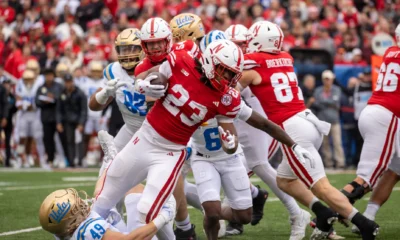

Football
/ 2 months agoHuskers Fight Hard but Fall Short Against UCLA
LINCOLN – The Nebraska Cornhuskers gave it their all on Saturday, with standout efforts...
-
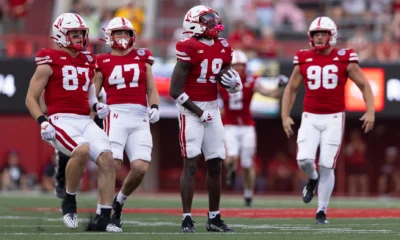

Football
/ 2 months agoGAMEDAY: Nebraska Set to Face Undefeated Indiana in Key Big Ten Showdown
Bloomington, IN – It’s Game Day, Husker Nation! Nebraska (5-1, 2-1 Big Ten) returns...
-
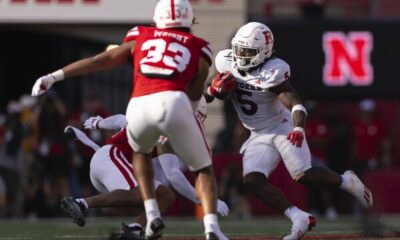

Football
/ 3 months agoBlackshirts Shine as Nebraska Tops Rutgers 14-7 on Homecoming
Lincoln, NE – Nebraska’s Blackshirt defense played a starring role in the Huskers’ 14-7...
By Chris
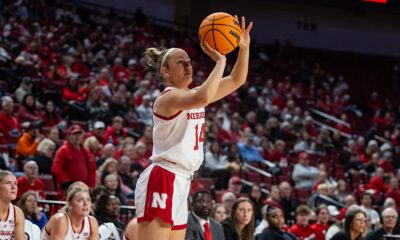

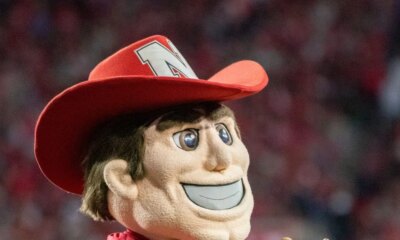

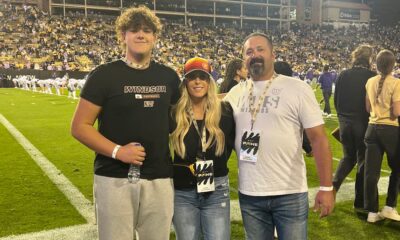

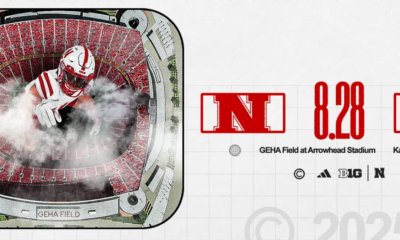

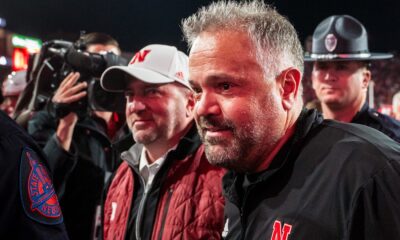




You must be logged in to post a comment Login